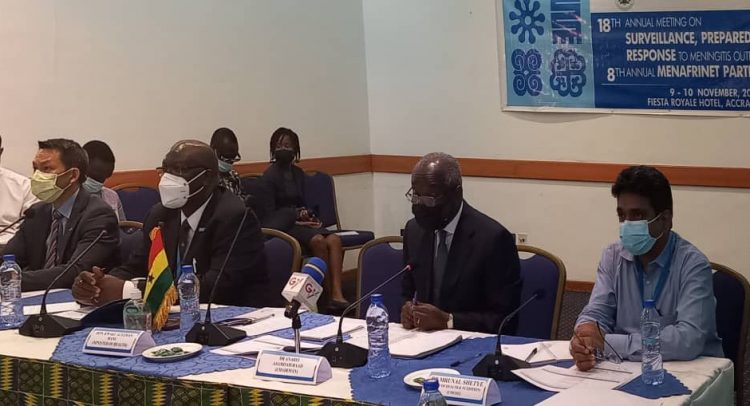The dignitaries at the event
The World Health Organization (WHO) has held a two-day meeting in Accra to prepare African countries on how best to respond to the epidemic meningitis season.
The meeting brought relevant stakeholders together to evaluate activities conducted in the previous epidemic season, take stock and strategize for the next season using evidence-based approach.
The strategies include the introduction of meningococcal vaccine for prevention of meningitis outbreaks, early detection, investigation and confirmation of outbreaks when they occur and the implementation of appropriate response measures.
Meningitis is a deadly and debilitating disease with serious health, economic and social consequences and remains a burden for countries in the meningitis belt.
In 2020, during the Covid-19 pandemic, 9,975 suspected cases of the disease including 541 deaths were recorded in 20 out of 26 countries with Ghana and Benin recording epidemics.
Ministry of Health, Kwaku Agyeman-Manu, opening the 18th meeting on meningitis said there has been real success in the fight against meningitis with more than 300 million people having been vaccinated in the meningitis belt of sub-Saharan Africa with the new meningococcal A conjugate vaccine.
“Thanks to the efforts of all including health professionals… Serogroup A meningitis has been successfully controlled through mass vaccination campaigns,” he added.
He said in Ghana, no Neisseria meningitides type A case has been reported in Ghana since 2017.
Mr. Agyeman-Manu noted that in addition to the constraints of Covid-19, other factors remain obstacles to the control of meningitis epidemics and must be addressed through enhanced surveillance and appropriate response.
WHO Country representative Dr. Francis Kasolo said the Covid-19 pandemic has shown how important it is to make the health system resilient so that essential services are not compromised while responding to shocks from public health emergencies.
He said the meeting created an opportunity to learn from other countries’ experiences and best practices on how they prepare and respond to epidemic meningitis outbreaks in the past season.
“The information sharing experiences will help to improve our collective efforts to prevent, detect and respond to meningitis outbreaks in the coming season as well as help all of us to embrace innovative ways in this response.
By Jamila Akweley Okertchiri


